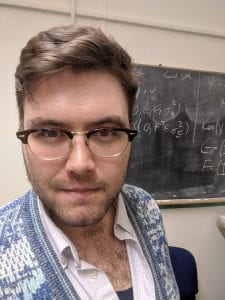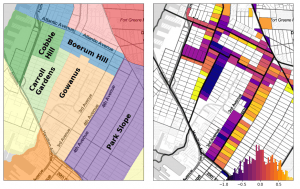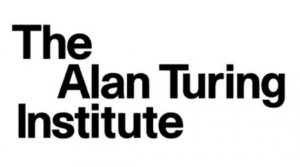
In our blog series ‘Introducing the University of Bristol’s Turing Fellows’, we have been finding out more about the thirty academics at the University of Bristol who have recently become Alan Turing Institute Fellows through a series of interviews.
You can find the first blog of our series, featuring Iván Palomares Carrascosa, as well as an interview with Paul Wilcox on the JGI Blog.
Next up, the Jean Golding Institute (JGI) spoke to Levi John Wolf, Lecturer in Quantitative Human Geography and Turing Fellow, about his work developing new mathematical models and algorithms in applications across a broad range of problems within the field of quantitative geography.
JGI: What are your main research interests?
I am interested in the fundamental computational and mathematical challenges that geography poses for social science. Many social problems involve situations where ‘who you’re around’ can affect what you do, or who you’re connected to can impact what you’re able to do. Quantitative geography as a domain, seeks to use information about geographical structures and relationships to do better social science. I develop new mathematical models or algorithms in applications across a broad range of problems in elections, campaigns, segregation & sorting, urban analytics, and inequality.
JGI: Can you give a brief background of your experience?
I did my PhD at Arizona State (defended December 2017) and worked as a fellow at the University of Chicago Center for Spatial Data Science during that time. I also took summers off during my PhD to work as a data scientist/engineer at Nextdoor.com, Inc. and CARTO, a spatial data science company. Since then, I moved from Brooklyn to Bristol in 2017, and have been lecturing at the University of Bristol.

JGI: What are the big issues related to data science / data-intensive research in your area?
The biggest issue with computational/quantitative geography is the difficulty of using the data we have in an effective way. While there are many data science methods that can be used to analyse spatial data, geographic relationships and models use special structures to model or leverage fundamental geographical relatedness or the distinctiveness of geographical areas. Existing techniques ignore geography most of the time, and we can build better models when we take geography into account; however, this poses a massive mathematical and computational challenge.
JGI: Can you tell us of one recent publication in the world of data science or data-intensive research that has interested you?
A very recent article I find really fascinating is the work by Fowler et al (2019) on the ‘contextual fallacy’, the assumption that a geographical ‘box’ or ‘container’ like the neighbourhood or LSOA (Lower Super Output Area) can accurately represent the social or geographical context that an individual experiences. Using individual-level census data, this research group has been able to unpack a half-century old debate about the fundamental way geographic data is structured, and can affect the conclusions drawn from it in quantitative analysis.
JGI: How interdisciplinary is your research?
Geography as a discipline tends to be outward-facing, and focuses strongly on problems that are in other disciplines. My own work on elections and redistricting links political science and sociology; my work on inequality reaches into econometrics and political theory alike. My main body of work engages heavily in statistics and computer science, two domains often not considered in the same thought as Geography.
JG: What’s next in your field of research?
Geographic data science. The cutting edge of quantitative geography is all about trying to figure out how to leverage geographical relationships and distinctiveness directly in new computational methods to build better predictions.
JGI: If anyone would like to get in touch to talk to you about collaborations / shared interests, how can they get in touch?
Follow/DM me on twitter @levijohnwolf, or email me at levi.john.wolf@bristol.ac.uk.
__________________________________________________________________________________________________________________________________________________________________
More about The Turing Fellows
Thirty fellowships and twelve projects have been awarded to Bristol as part of the University partnership with the Turing. This fellowship scheme allows university academics to develop collaborations with Turing partners. The Fellowships span many fields including key Turing interests in urban analytics, defence and health.
Take a look at the Jean Golding Institute website for a full list of University of Bristol Turing Fellows.
The Alan Turing Institute
The Alan Turing Institute’s goals are to undertake world-class research in data science and artificial intelligence, apply its research to real-world problems, drive economic impact and societal good, lead the training of a new generation of scientists and shape the public conversation around data.


